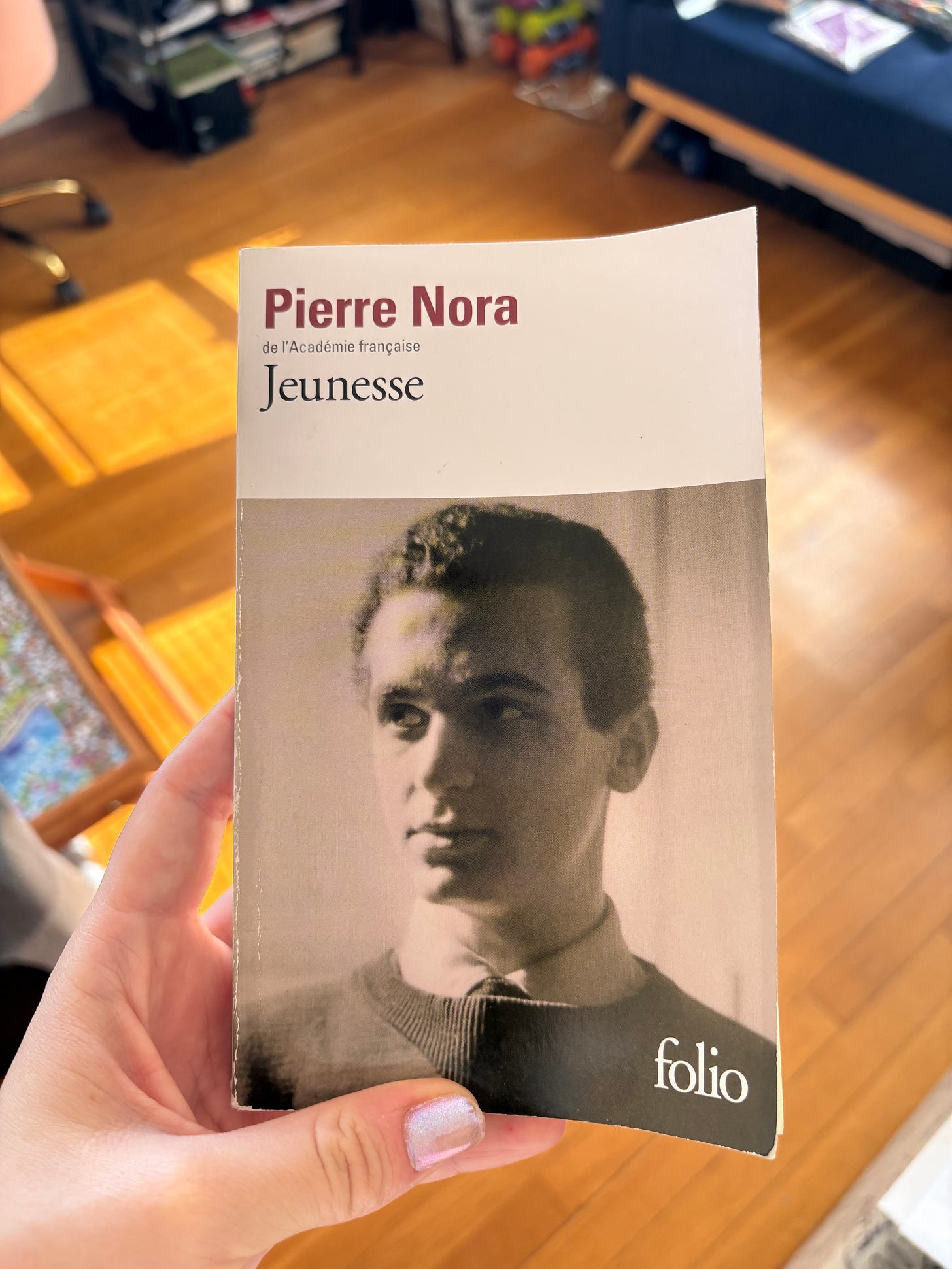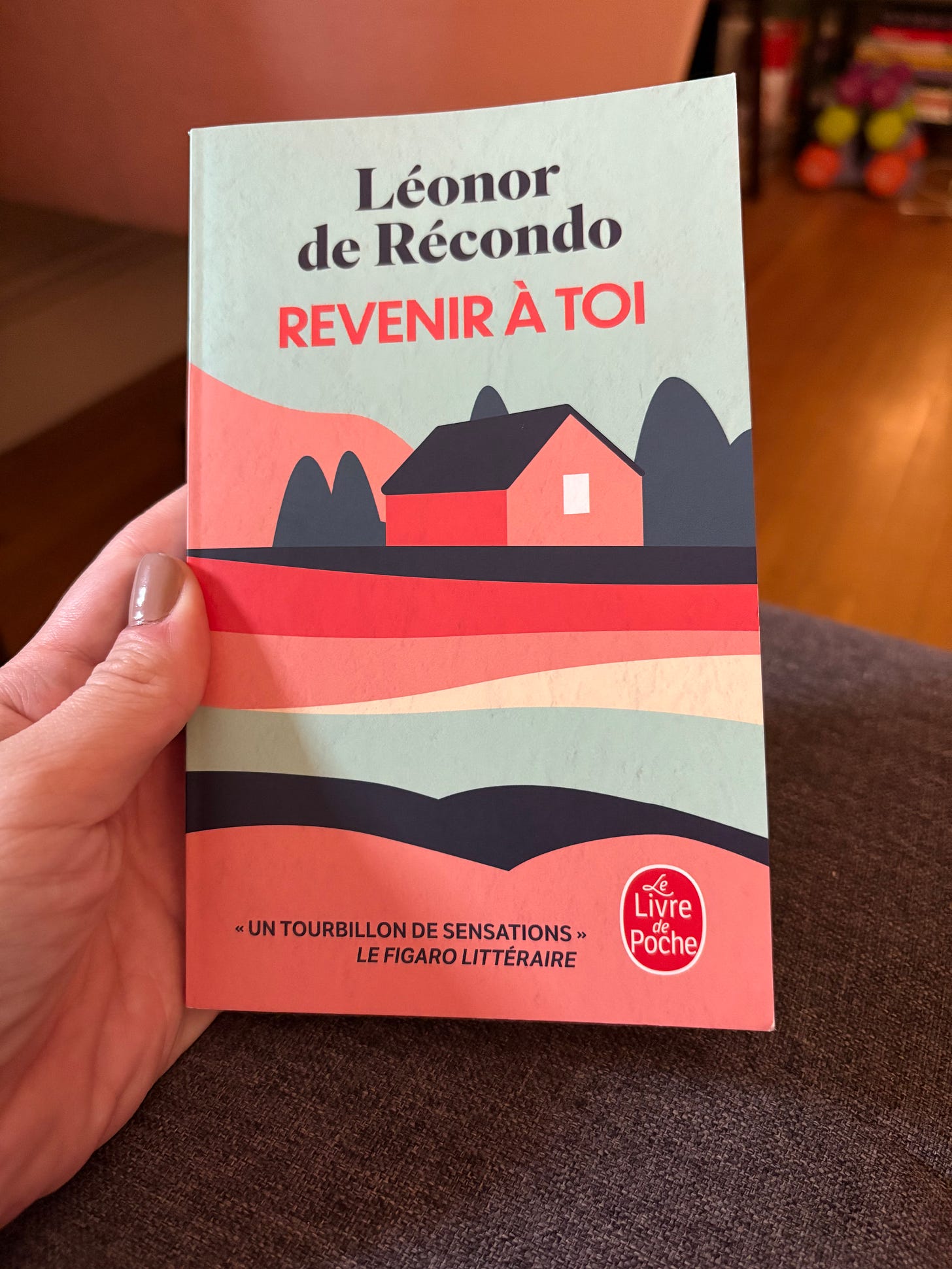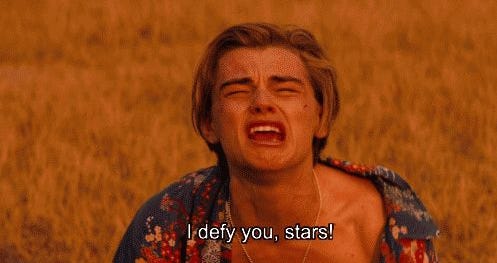What I Read in June
Dazed and Confused Edition
Now that July’s half over, it only makes sense to talk about what I read in June. I got the half yearly goal recap out on time, so that’s going to have to count for my timeliness this month.
I read 9 books in June, which is honestly rather impressive as I had the most 0 page reading days in June than I have had in a long time.1 I had 5 days where I read absolutely nothing in June, including two that were back to back.2 I’m not sure what about June is conducive to a reading slump for me (this happened back in 2023 as well), but I rebounded nicely. Were some of the books short? Sure. But that’s not the point.
Many of these books I read on my recent reading retreat to Maine, so the titles may sound familiar if you’ve been around for a minute.
Unless otherwise noted, all books were physical. All photos are mine, all graphics are from The Storygraph.
June Reads
Two Twisted Crowns by Rachel Gillig
The second book in The Shepherd King Duology, and my book club’s book for this month. Look, I loved this. The vibes were 100% correct and what I needed right now. To me, it was a realistic depiction of how weirdly and dumbly humans would behave if given access to magical objects. There is an entire subplot involving one of the main characters being terrible at holding onto a pair of KEYS, and this inevitably causes his downfall. I loved it, even if not everyone in my book club did. 10/10, no notes. I came for a good time and I got it. I may or may not have gone and bought some special editions of it for reasons. I technically read this on my iPad as I had the digital file for it, but I do own a physical copy now so who knows what this counts as.Jeunesse par Pierre Nora
As I mentioned in my post last week on reading diversely, I chose to read this book as it differs wildly (in some respects) from what I read on a daily basis. It’s actually quite startling how haphazardly I pick my French books: if it’s a book I haven’t read and the summary sounds even somewhat interesting, I’ll get it. I am not this liberal with my English books. This is all to say: I had no clue what this book was about when I picked it up. Maybe I did when I bought it, but I had long since forgotten. To give some background: Nora was a famed historian in France who was elected to L’Academie Française.3 His father was a noted urologist, and his eldest brother was a noted statesmen. They were all also Jews who survived the WWII Vichy regime in France. Nora notes that for years people told him to write his memoirs, and he concedes in his introduction that he had no idea what that would look like since his thinking is not linear. Instead, he chose to group themes together as they started in his childhood, and how they influenced him: his family, his studies, love, and so on. At least, that’s the best way I can think of to describe it. As someone who wrote for a living, Nora’s prose was very easy to read, which as a non-native speaker I appreciated. I don’t believe this is translated into English, unfortunately, so if it eventually appears one day, I’d recommend it.The Brief and Frightening Reign of Phil by George Saunders
This novella by George Saunders has been out for a minute, but I only recently learned about it. A story of how Phil, an Outer Horner native who decides to exact revenge/taxes/evil against the citizens of Inner Horner, a nation so small that only one person can stand in it at a time. A smart satire (that is also speculative fiction?) it pokes fun at how a lot of contemporary issues are dealt with in American politics: immigration, elder statesmen, taxes, intolerance, and injustice. I’m not an audio book girlie (especially with fiction), but if the author is reading their own work I tend to make exceptions. George Saunders is great, so I’d give this a listen if you can. I listened to this on Everand.Pathways by Leyla Kazim
I learned about this book from Emma Gannon’s newsletters.4 It’s a two book set from the Pound Project, and is about Kazim’s journey from living in London to buying land in Portugal, where she and her husband will create a self sustaining farm, fishing pond included. The books include journal prompts for the reader to reflect on their own status quo in life and if big changes are needed. It was a nice read, but given the fact that the books were both very small, there were lots of details lacking and I wanted to know more. It’s sold out on the Pound Project’s website, but the press does have other titles available and they do ship internationally.A Palace Near the Wind by Ai Jiang
Ugh was this such a disappointment. There were two main problems here (in my particular opinion): the book was a novella that really could have been expanded into a novel, and I had no emotional connection to the main character. Because of the shortened format, the worldbuilding was favored at the sacrifice of emotional depth. I understood from a logical level why the main character Lufeng was doing what she was doing, but it felt like I was watching charades: it was happening but it had nothing to do with me and I felt no connection to it. Jiang has won a few awards (the Bram Stoker and Nebula) so I’m sure she’s a good writer. I will try some of her other work, but this book was just not for me. I will probably donate my physical copy and will read the second book of this duology on Libby when it comes out next year. Because obviously I need to know what happens even if I didn’t like the book. I am a completionist, after all. Yay libraries.The Glittering Edge by Alyssa Villaire
Confession time: I only ordered this book because I saw that an artist I like (frostbite.studios) did the end papers for this book. I don’t have a Fairyloot subscription, so I got it second hand. (#savingtheenvironment) I had no idea what this book was about before getting it,5 I just loved the cover and the art and the purple of it all, and I am so glad to say that I wasn’t disappointed. There’s a Romeo and Juliet style feud between two families in this small Indiana town, and our main gal Penny gets caught in the crosshairs. She wants to remove the curse that’s killing her mother, and wrangles the two teenage scions of these feuding families to help her. It’s the first book I read that uses texting as a good plot point and doesn’t come off cringe as doing so.6 There’s magic, and a cat, and secrets and all sorts of witchy stuff that I love. This is also the first book in a duology, and book 2 will be out next year. Obviously I will be getting a matching special edition when it appears.Revenir à toi par Leonor de Recondo
Another book where I really had no idea what it was about before jumping in. The plus here was that it was short. But it was literary fiction (à la française) and I honestly enjoyed it. Magdalena is a famous actress, and one day gets a call that the mother who abandoned her 30 years ago has been found in a house near Bordeaux. There’s not a lot that goes on here plot wise, but the characters are drawn so well and their interactions are so interesting that I was invested. It was also a somewhat strange scenario to begin with (famous actress meets her mute/homeless/mentally ill mother whom she hasn’t seen in 30 years) so there was a lot of potential for this book from the beginning. There’s no quotation marks and the POV switches perspective a few times, which usually is a big no-no for me. But like one of my professors says: there are no rules in writing. The only rule is that it has to work. And this book works. This book is also not available in English, alas.Orbital by Samantha Harvey
The 2024 Booker Prize winner, Orbital drew lots of attention when it won last year. And I am here with my own controversial-yet-brave opinion: it was fine. I enjoyed it at times. The writing was beautiful. But this isn’t science-fiction. I know it was proclaimed as the first Sci-Fi winner of the Booker, but I disagree. This is mimetic literary fiction in space. Let me explain.
Science fiction as written by the greats and giants of the genre (Urusula K. Le Guin, Octvaia Butler, Frank Herbert, and so on) explores a possibility of what humanity could do or be. Most of the time that happens in space, but it doesn’t have to. Conversely, just because a book is set in space does not automatically make it Science Fiction. Science fiction is a conjecture of what humans could do with technology/weapons/society in the future, and what that says about our current state of the world. Orbital does not do that. It is a well written book, but it describes a day in the life on the space station. There is no conjecture, there is no thought experiment. It is merely description of how life is. It doesn’t need to say much about the current state of the world because it’s already describing it, mirroring it back to us the reader. The only thing that makes this book stand out is that it’s in space. If you were to put 6 people together in a train compartment or a boat and write a book about that, you’d come up with something very similar. The setting is what makes this book unique, not the content. Orbital is less about what the space station means or its technology: it’s about the mental and emotional experiences of its crew onboard.
Another example: The Martian versus Orbital. The Martian is ‘hard’ Science Fiction because it relies so heavily on real scientific explanations. NASA even confirmed that if something like The Martian had happened, the technology and strategy that Andy Weir detailed is accurate to what they’d do to bring a stranded astronaut home. The Martian: a thought experiment in story form about what would happen to a stranded astronaut and how he’d be brought home using the technology available to us: Sci-Fi. Orbital: a description of life on the space station as seen through the eyes of it’s 6 crew members: mimetic literary fiction.
If you think I’m ragging on this book because I hated it, that is incorrect. I thought the writing was beautiful, and again did not react to it as strongly as I thought I would have, given the ~discourse~ about it. This very much reminds me of La La Land. I enjoyed that movie because 1) I lived in LA for a time and 2) I saw it before it got majorly hyped. I had time to form my own opinions about the movie without being bombarded with reviews of how great it was. Conversely, I saw The Artist in 2012 after it had received a whole bunch of acclaim and found it to be lacking. I think that’s what’s going on here with Orbital and I can’t say I disagree. But in the end, this isn’t science fiction to me, just another literary fiction book, but in space. Award worthy? Sure. But not Science Fiction. That’s my stance and I will die on this hill.7Howl’s Moving Castle by Dianna Wynn Jones
Another Fairyloot special edition. Again I don’t have a Fairyloot subscription, but you’d be surprised to see how much of a secondary market has sprung up for these special edition books. Good news: it was short and I finished it and I enjoyed it! Once again I now need to watch the Miyazaki version. Bad news: I did not realize this was the first in a trilogy; I thought it was a standalone book like Kiki’s Delivery Service.8 That means that not only do I have to read the next two books, but I also need to get the matching Fairyloot editions so that I have a complete set. Sigh. Being a book nerd is hard work.
What you will not find on this list is West by Edith Pattou, the book I said in last month’s reading recap that I’d be reading this month. I should know by now to never make declarations about what books I’m going to read because I will inevitably disregard them. My logic was thusly: I only read one book a month on Everand. I can read more, but I don’t, because I have so many books already that I should be reading more of those. But since it’s a service I pay for, I need to at least read one book a month to make it worthwhile monetarily. And this month I listened to an audiobook, (the aforementioned Phil by George Saunders) and read a book digitally (the aforementioned Twisted Crowns), so I had already met my quota for digital books and so therefore couldn’t read West. I’ll read it in July instead.9
You absolutely did not need to know any of this, but if you wanted a quick peek into the anxious jumble that is my brain, there you go. I’m a writer; by default I have to have a few bizarre habits and reasonings.
No New Books™️ Challenge
My evil master plan was going so well, and then I realized something. The next Carissa Broadbent vampire book comes out in August. Early August. I did not preorder it. Which means I need to get it.10 Which means that my calculations for how long I can hold off on buying books have now gone out the window. *shakes fist at sky* I defy you stars!
If you’re asking the (very reasonable) question: “Marissa, do you need to get the book on the day it comes out in early August?” The answer is of course yes I do because it’s a series continuation, and the rest of my book club will get it as well and we’ll all be racing to finish it and scream about vampires so how can I deprive myself of that experience? FOMO in real time. You’ve already been introduced to my bizarre thought process this newsletter, so this shouldn’t come as a surprise.
So, uh, I have to go buy another book I guess. Ruining my grand plan of making it to 50 days without buying books. But for now, the grand master plan is unspoiled and continues.
Longest streak: 38 days (January 1st - February 6th)
Last streak: 14 days (May 7th -20th)
Current streak: 28 days (June 18th - Present)
Mug Moment of the Week
I’m here to address a common question that no one has asked but that you’re probably all wondering: no, my consumption of hot beverages does not decrease despite how hot it is outside. You’d think, but no. I am nothing if not contradictory.
The warmness of tea and its container are more about creating an atmosphere of coziness, not necessarily needing to inspire warmth. Like I said, I regulate my body temperature poorly: I often need various blankets, cardigans and AC units throughout the day to stabilize myself, so adding a hot cup of tea isn’t going to tip the scales that much in terms of homeostasis.
Now that we’ve gotten that out of the way, the Mug Moment of the Week featuring: the latest Illumicrate mug.
ISN’T SHE PRETTY?? Featuring artwork by Rosie Thorn and intrepid cinematography courtesy of yours truly. The artwork is inspired by Roshani Chokshi’s The Last Tale of the Flower Bride. Which I have not read yet, but have saved in my library queue for a future read.
I love the purples here (as I said last week and today, ya girl loves a purple) and the design is so whimsical and flowing. 10/10, no notes, even if the mug is a tad small for me.
Until next time, when I’ll have a list of local Rhode Island bookstores for you. Toodles!
I track this in a reading journal I got from an Illumicate box last year.
The horror!
Basically the best French person you could possibly be. Founded in 1635 by Cardinal Richelieu (of The Three Musketeers fame), L’Academie Francaise is a quintessentially French institution dedicated to the preservation of the French language. I know of no other equivalent worldwide. Though always, if I’m wrong, tell me.
Should probably do a post talking about where I learn about books, huh?
I’m spotting a theme here.
But what do I know, I’m just an elder Millennial.
Why do I keep doing this?
Or maybe I’m reading it right now or have already read it. I’m writing this post ahead of time so who knows what future Marissa will do.
There is no debate on the word need here. My book club will be reading it so it MUST be acquired. And I need a matching set natch.








No need to perish over Orbital, Marissa. Agree it’s not SciFi, just literary fiction. It teases, like mentioning the other, new mission leaving orbit, but this only creates tension in the story as the station inhabitants feel left behind in the exploration of space. It’s also written as if one is using Google Earth. Marketing departments can be forgiven when trying to push their publications onto whatever shelves will take them. Thanks for the recs.